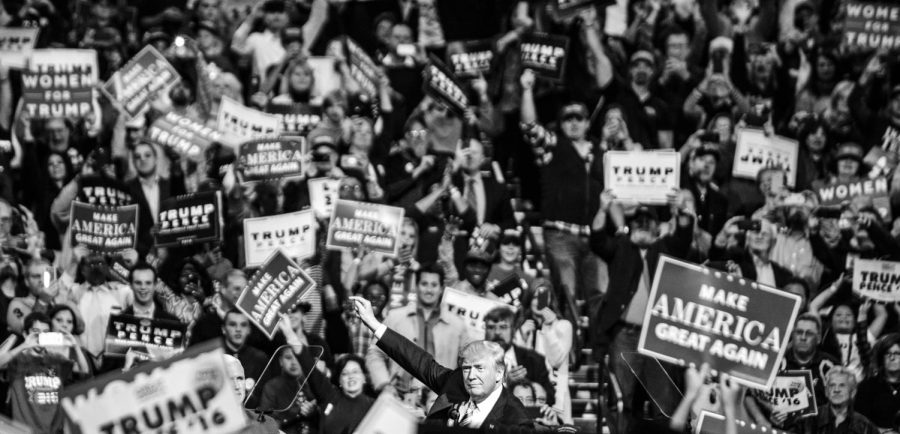Takeaways from the first 50 days of the Trump administration
Republican presidential nominee Donald Trump incites the crowd to cheer louder at the I.X. Center in Cleveland, Ohio on Saturday, Oct. 22, 2016.
March 10, 2017
Saturday, March 11 marks 50 days that President Trump has been in office.
The Trump administration is unique, but there are some similarities between the 45th president and his predecessors.
Mark Cassell, professor of political science, said he believed Trump used energy from the success of his election to create policy, which won’t be the case throughout his entire term.
“There’s still often good will and the political bump from having won an election,” Cassell said. “Then, reality sets in and a lot of things happen after that which are very different from the first 50 days.”
He thinks Republican control of both chambers of Congress — in addition to the presidency — gives Trump an unusual amount of power, despite losing the popular vote.
Cassell said he felt the standard of ethics in the Trump administration is more concerning than the policies presented.
“Once you get rid of norms, they’re very difficult to reestablish; values and norms don’t come back easily,” Cassell said.
Republicans and Democrats alike feel that a major factor changing the norms of the presidency is Twitter.
Anthony Erhardt, president of the Kent State College Democrats, said he thinks President Trump’s leadership style is a problem in this administration.
“He needs to be more presidential, less bombastic and abrasive. He needs to stop tweeting. It’s delegitimizing the office of the president,” Erhardt said.
Jacob Tabler, vice president of the Kent State College Republicans, said he doesn’t feel Twitter is a big issue, but it is shaping the administration.
“Obviously, the messaging is very different from any administration,” Tabler said. “The use of Twitter is obviously different, but I don’t think it should be taken seriously.”
Tabler said Republicans are most concerned with spending and the national debt, which is crucial to enact conservative policies.
“Continue to decrease regulation, allow for more competition in the health care market, keep supporting Israel,” Tabler said. “I would not like to see as much spending on infrastructure as he’s proposed.”
Erhardt admits anything heavily conservative is against his political beliefs, but he’s most concerned about the Affordable Care Act leaving more people uninsured.
“There was a repeal of the Affordable Care Act without a suitable replacement,” Erhardt said. “They had seven years to come up with a plan. This new plan is anemic and it’s going to insure less people.”
Cassell said Trump should be weary of running the country as a corporation. He expressed that the president should work with Congress and interest groups affected by his policies.
“It’s clear that he sees promising things as simply a tool to achieve something he’s interested in,” Cassell said. “At the end of the day, he knows he won’t be able to deliver on those, but he knows they serve his purpose by enabling him to do the things he wants to do.”
To summarize the first 50 days of the Trump administration in one word, each side had very different answers.
“Fascist,” Erhardt said.
“Busy. He’s only been in office for 50 days and it feels like six months. There’s been a lot going on and a lot of changes,” Tabler said.
Caelin Mills is the student politics reporter, contact her a [email protected].












